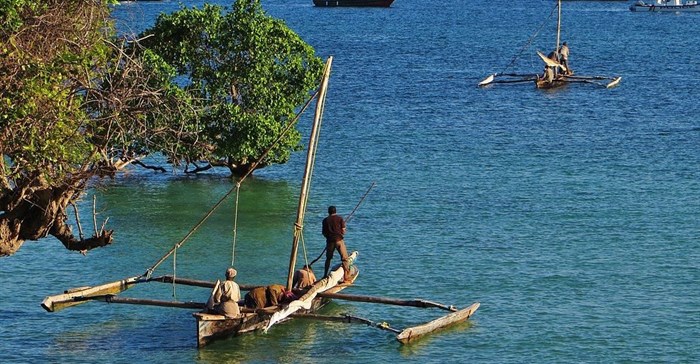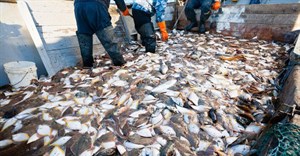What Kenya's government can do to protect, and benefit from, ocean resources

Declining health in Kenya’s marine resources is evident in traditional small-scale fisheries, the growth in commercial fisheries, conflicts among fisher groups and in the increased use of gear such as ring nets. These damage coral reefs and catch small fish before they reproduce thus reducing the stock of fish available.
Kenya also suffers from declining coastal and marine habitats, such as its coral reefs and mangroves, due to climate change.
Economic pressures on Kenya’s coastline are making the situation worse. Around the world, population growth in the coastal zone is generally double the national average, as people are attracted to the coasts by the cities, and jobs in transport and tourism. These pressures from growing coastal populations threaten the economic sectors and people that depend on them unless they’re properly managed. One of the most vulnerable sectors is tourism which in Kenya accounts for 90% of the income dependent on the sea. Healthy reefs and beaches are essential for these income streams.

Kenya’s ocean economy broken down by different sectors (excluding shipping and mining, which don’t depend on living resources). Source - Obura et al. 2017, Western Indian Ocean Economy report.
Kenya’s newly elected politicians will soon be turning their attention to fulfilling their campaign promises. I believe that one area of urgent attention is the marine and coastal environment. I have identified four key actions building on government priorities in the recent past. These can be the foundation for a broader array of actions over time.
Key actions
Action 1: The Sustainable Development Goal (SDG) 14 commits countries to:
Conserve and sustainably use the oceans, seas and marine resources for sustainable development.
Increasing countries’ wealth from the sea is a priority for many African governments, with the African Union establishing the blue economy as a foundation for Africa’s future. But there’s a risk that sectors and companies will attempt to ‘get rich quick’ from the sea without a long term vision of sustainability to ensure future generations can continue to benefit.
President Uhuru Kenyatta’s went some way towards the SDG goal last year when he made the blue economy a priority, setting up a Blue Economy Task Force. And the country sent a delegation, including members of the Task Force, to the UN Ocean Conference this year. The Call to Action agreed by governments was backed up by two commitments from Kenya on the blue economy and sustainable fisheries, a promising sign and some direction for the Task Force to focus on in coming years.
Action 2: Securing the capital, or natural habitats, must be a top priority. Best practice established by the International Union for the Conservation of Nature says that a certain amount of nature should be managed in a state as close to natural as possible, such as the Seychelles’ Aldabra Atoll. A global target has been set by almost all countries to secure 10% of all oceans in protected areas by 2020. But experts now feel this is just a stepping stone to the final goal, which should be around 30%.
Kenya currently manages just 1% of its ocean territory in protected areas, most of which is in marine reserves, which allow fishing. So it’s unlikely the country will meet the target of 10% by 2020. But by taking steps to empower local communities to manage reserves on the shoreline combined with setting aside larger offshore areas to preserve fishing stocks for the future, it could be possible to establish sufficient momentum to reach 30% by 2030.

Local fisherman fishing in Mida Creek mangroves, Watamu.
Marius Dobilas / Shutterstock.com
Action 3: Kenya’s beaches are littered with plastic and other floating waste. National campaigns are needed to mobilise the country and return beaches to a clean state. The recent announcement to ban plastic bags is a good start. But this should be expanded. There should be a zero-tolerance approach to all waste on beaches, most of which is now plastic bottles.
Reducing waste should be done by building better waste management systems and proper waste collection. Youth and ‘cottage’ industries should be promoted for waste collection (rather than large scale commercial recycling operations) that can turn the waste into useful products for local sale and reuse.
Action 4: The environmental impact of infrastructure projects needs to be managed better. The number of infrastructure mega-projects on the coast has grown exponentially over the past 10 years, including the Standard Gauge Railway, LAPPSET port and Amu coal plant. Opposition to all of these – on environmental as well as social grounds – has been ferocious. But this didn’t stop the projects being approved without adequate environmental controls in place, resulting in court and tribunal hearings to either stop them or improve their practices.
Strengthening the implementation of environmental impact and strategic assessment regulations should be an immediate priority. And there must be adequate skills to develop these in the relevant professional bodies and in government.
![]() By starting with these actions Kenya’s new government could transform the future of the country’s ocean space. The next 10 years are essential in ensuring key foundations are laid to ensure businesses dependent on the country’s ocean resources are sustainable beyond 2030. Without action, key overshoots will more likely make long term sustainability impossible for many resources and marine environments.
By starting with these actions Kenya’s new government could transform the future of the country’s ocean space. The next 10 years are essential in ensuring key foundations are laid to ensure businesses dependent on the country’s ocean resources are sustainable beyond 2030. Without action, key overshoots will more likely make long term sustainability impossible for many resources and marine environments.
This article was originally published on The Conversation. Read the original article.
Source: The Conversation Africa

The Conversation Africa is an independent source of news and views from the academic and research community. Its aim is to promote better understanding of current affairs and complex issues, and allow for a better quality of public discourse and conversation.
Go to: https://theconversation.com/africaAbout David Obura
David Obura, Adjunct Fellow, The University of QueenslandRelated
Part 1: Scopen 4th Latam Sustainability Study: 6 key findings 29 Oct 2024 Eduvos unveils Research Agenda to empower sustainable development in Africa 31 Jul 2024 10 startups receive R1.1m funding to boost Africa's blue, green economy 1 Jul 2024 World Intellectual Property Day Celebrations 2024 media invite 25 Mar 2024























